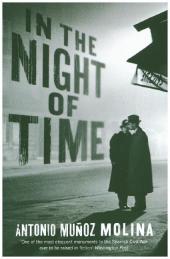IN THE NIGHT OF TIME
Antonio Muñoz Molina (trans. Edith Grossman; Tuskar Rock, 2015) ISBN: 978 1 78125 463 9. RRP $35.99 
Antonio Muñoz Molina is a Spanish literary heavyweight who I, poor ignorant, had never heard of before reviewing this book. In the Night of Time is his 23rd book, a tome of luscious long paragraphs* and reverie; of love and desire; and of Spain at the outbreak of the devastating civil war of the 1930s.
My familiarity with Spanish literature, it must be said, is virtually non-existent. I’m also not particularly well-apprised of the history of Spain, with my familiarity of any kind ending with the reign of of Ferdinand and Isabella. That’s a good 650-odd years of history there. Shame on me. But the point of all this is to say that I can’t really comment on a number of matters regarding Molina’s novel. Is it historically accurate? It… seems to be. Where does it fit in terms of Spanish-language literary trends? It kind of seems vaguely similar to some of the South American books I’ve read in the past? So for that I apologise, guys.
In the Night of Time is a beautifully arranged and written tale. It follows the recollections of the architect Ignacio Abel as he travels to a new life in the United States after being offered a job there, enabling him to escape war-torn Spain. As he travels, he remembers the years and months leading up to the war; the political strife and the steady unravelling of every aspect of his life in the wake of his affair with American wayfarer Judith Bielly. Molina demonstrates supreme skill in evoking interwar Europe. Weimar Germany especially is illustrated with the kinds or rose-tinted strokes one would expect from an older man’s recollections of his youth there. Where poverty in other parts of the novel is depicted as a desperate thing, Ignacio Abel’s fond memories render the impoverished in Berlin with a glamorous air. Many of the descriptions throughout the novel, in fact, bear a glorious cinematic quality.
This vintage photograph feeling lends itself well to one of the novel’s major themes — the old and the new, and the passage of time that renders the new ancient. The power of human structures to inspire, to endure against any manner or strife in our relatively short lives. Molina captures the majesty of suspension bridges and skyscrapers — atypical examples, it could be said, of aging and elegant buildings, especially in the Spain of the Great Mosque of Cordoba and any number of other great houses, churches and palaces. Having never given much thought before to the genius of bridges, I found this new look captivating. It is always pleasing to find new things to admire in one’s world.
However, the theme of time is driven home rather heavily. The novel could have used a more aggressive edit. As it is, it reads as though Molina is afraid his audience may miss his intended meaning and his symbolism. Some of the passages drifting through the varied meanings of time in relation to, for example, Ignacio Abel’s affair with Judith Bielly, become quickly monotonous and I confess I found myself skimming several paragraphs at a time. It is also unclear at times whether the author intended some of the repetitions that arise in the narrative; whether they are the result of a stylistic choice, or an oversight.
The novel is also very masculine. This is not something easily explained, especially to men. The novel is, essentially, another about a university professor who falls for a younger woman and launches into a destructive affair. The fascinating setting and beautiful writing could not salvage that staid cliche. The novel’s women seem to have lives that revolve around Antonio Abel. His wife is depressed, apparently because of his emotional distance, and of course his paramour is in love with him despite an age gap of 20 or so years, and it isn’t made abundantly clear what she actually finds attractive in him. Even the politics seems to generate from male aggression as much as ideology. I finished reading this book with a longing for a feminine voice. The absolute male gaze presented in this book exhausted me. Molina’s utter failure to channel the feminine also undermines another of the novel’s themes, that of relationships between men and women.
I have no doubt this book will be praised for its lyricism, its interesting and lively setting, and characters. The writing is poetic, clear and vivid, but the story at its core bored me. This may be a simple matter that, as a young woman, I have little in common with a middle-aged man’s struggle with fatherhood, infidelity, and betraying his working class roots. But I was interested in the setting and the politics of the time, so I’m not sure if that does quite explain it. Please, if you are a woman — or a man, or anyone really, I try not to intentionally discriminate — read it and give me your thoughts.
*This may be a difference in paragraphing style between Spanish and English. Having scarce familiarity with the Spanish language, I can’t really say.


I wonder how ones goes about securing Grossman to translate your novel. I confess, I don’t know Molina either, but I certainly know Grossman